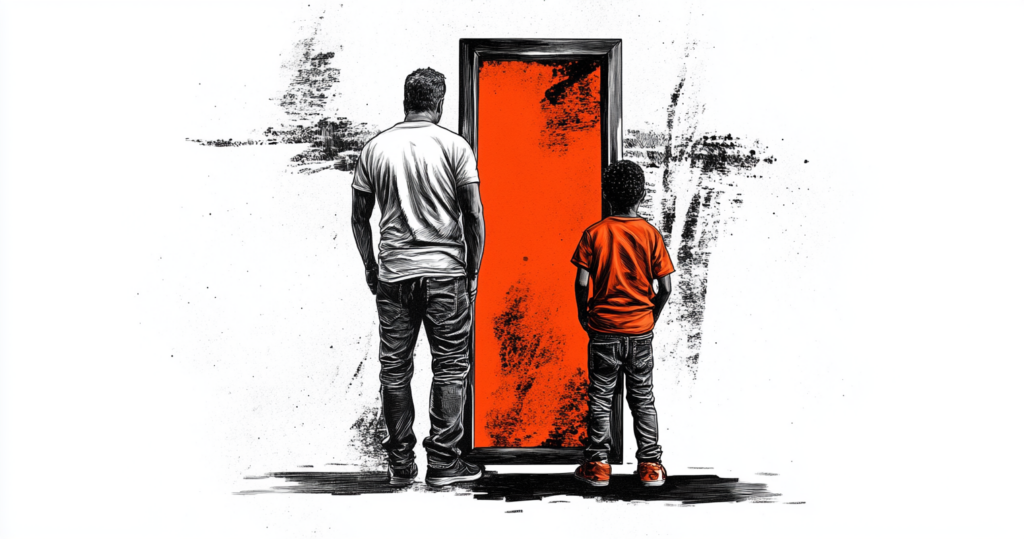What Your Kids Are Learning About Being a Man, Just by Watching You.
I used to think I had to teach my kids how to be good humans. Then my 6-year-old looked me dead in the eye and said, “Dad, if you don’t let me have ice cream then I am not going to be a good listener.”
I froze. Those words. That tone. That manipulative little ultimatum wrapped in a threat.
Where had he learned that?
Oh. Right. Me.
“If you don’t pick up your room then we are not going to go to the park.” How many times had I said some version of that? And here was my son, serving it right back to me with the confidence of a seasoned negotiator.
That’s when it hit me like a freight train: he’d already learned more about being a man from my bad habits than from any of my well-intentioned speeches about character and integrity.
The Unseen Curriculum
Here’s the thing that keeps me up at night: we’re always teaching, even when we think we’re not. Especially when we think we’re not.
While I’m over here planning the perfect father-son talk about respect and responsibility, my kids are getting a PhD in “How Dad Actually Operates” just by existing in the same house as me. They’re absorbing my sighs when I’m frustrated. They clock how I talk to their mom. They’re noting whether I actually follow through on what I say or just make empty threats.
And here’s what really gets me: they’re not just learning how to behave. They’re learning what it means to be a man. Every day, I’m holding up a mirror, and they’re looking into it thinking, “So that’s what men do. That’s how men handle things. That’s what masculinity looks like.”
The curriculum isn’t what I say during our heart-to-hearts. It’s how I live when I think no one’s watching.
What They’re Really Watching
Let me break down the areas where I’ve realized my kids are getting their real education in manhood, not from my words, but from my life.
Emotional Regulation: Do You Rage, Retreat, or Respond?
End of a long day. Kids are being kids, which means they’re not little obedient robots (shocking, I know). I’m tired. They’re not listening. And what do I do?
I snap. Sometimes I yell. I get frustrated and grumpy and suddenly the house feels tense.
And guess what? Three of my four kids have started modeling this exact same pattern. When they’re overwhelmed or things don’t go their way, they default to frustration and lack of control. Because that’s what they’ve seen modeled as “normal” masculine behavior.
But here’s the plot twist: this morning, when my boys were squabbling with each other, you know what they did? They started literally running around the house, up and down the stairs, jumping over furniture, announcing to everyone that they were “working out.” They took their frustration and channeled it into movement.
Where did they learn that? From watching me handle stress by working out. The good modeling stuck too.
The question that haunts me: What version of emotional regulation are your kids absorbing from you?
Presence and Attention: Do You Check Out or Show Up?
I’m always telling myself I want to be fully present with my kids. But if I’m being honest, I’m also always fighting the urge to check my phone for emails, or dive into writing this newsletter, or scroll through social media late in the evening.
My kids see this. They’re learning that being a man means being physically present but mentally elsewhere. That your attention is always divided. That whatever’s on that screen is more important than what’s happening right in front of you.
And then I wonder why they struggle to focus or why they seem to expect that conversations will be interrupted by devices.
Are you teaching presence or distraction?
How You Treat Women
This one comes straight from my father’s playbook, the good stuff. He taught me to work hard and contribute to the family so others could thrive. But more importantly, he modeled a deep love and respect for my mother.
I’m trying to pass this on to all four of my kids. To my boys, so they know how to treat women. To my girls, so they come to expect that level of respect from men.
But it’s not enough to just not be disrespectful. They’re watching how I speak to their mom when I’m stressed. How I respond when she’s had a hard day. Whether I see her as a partner or just assume she’ll handle all the emotional labor of the family.
Every interaction is a lesson in what they should expect from men and what they should demand for themselves.
What are you teaching about how men should treat women?
Work Ethic vs. Work Worship
There’s a fine line between modeling good work ethic and teaching your kids that your worth is tied to your productivity. I want them to see that men contribute, that we work hard for our families, that we take responsibility seriously.
But I don’t want them to learn that men disappear into their work, or that being busy equals being important, or that rest is weakness.
This is where I’m still figuring it out. How do you model dedication without modeling obsession?
Are you teaching work ethic or work worship?
Resilience: How Do You Fail, Adapt, and Recover?
Kids are going to mess up. They’re going to face disappointments, failures, and setbacks. And they’re going to look to see how men handle these moments.
Do you blame, numb, retreat, or rise?
My kids have watched me fail at things. They’ve seen me frustrated with my own mistakes. But they’ve also seen me get back up, try a different approach, and keep moving forward.
That’s the kind of resilience I want them to carry into their own lives.
What story of masculine resilience are you writing for them?
The Cost of Avoidance
Here’s what terrifies me: if I don’t get intentional about the mirror I’m holding up, something else will define masculinity for my kids.
My boys will learn what it means to be a man from TikTok influencers, YouTube personalities, or the loudest voices in their friend groups. My girls will form their expectations of men based on whatever fills the void left by my silence or inconsistency.
And let’s be real, the world’s version of masculinity isn’t exactly inspiring these days. It’s either toxic dominance or apologetic passivity. It’s either “real men don’t cry” or “masculinity is inherently problematic.”
If I don’t define what it means to be a good man, something else will. And I probably won’t like their definition.
From Mirror to Model
Here’s where I want to be clear: this isn’t about being perfect. God knows I’m not. My kids see me mess up regularly, and honestly, that might be one of the most important things they can see.
You don’t need to be a flawless man. You just need to be a present one. A growing one. A man who’s honest about his struggles and intentional about his growth.
The goal isn’t to never make mistakes in front of your kids. It’s to show them what it looks like when a man takes responsibility for his mistakes, learns from them, and tries to do better.
Recently, I started asking myself a different question: If my kids had to define masculinity based solely on watching me, what would their definition be?
That question is both humbling and motivating. Because the answer isn’t just about who I am right now. It’s about who I’m becoming.
The Mirror Test
So here’s my challenge for both of us: ask your kids what they think makes someone “a real man.” Not what you’ve told them, but what they’ve observed. What they’ve absorbed just from watching you live your life.
Their answers might surprise you. They might convict you. They might encourage you.
But they’ll definitely show you what reflection you’ve been holding up.
Last week, I asked my 8-year-old this question. His response? “A real man helps people and says sorry when he messes up.”
I’ll take it. That tells me something good is getting through, even on my worst days.
Your kids are watching. They’re learning. They’re absorbing what masculinity looks like by watching you navigate your days, your relationships, your frustrations, and your failures.
You already are the man your child is watching. Now you get to decide what story you want them to see.
The mirror doesn’t lie. But it also doesn’t judge. It just reflects.
The Focused Fool Newsletter – Growing As Men. Leading As Fathers.
What do you think your son or daughter would say makes someone “a real man,” just based on watching you? Hit reply and let me know. I read every single one, and your honesty helps all of us grow.


Leave a Reply